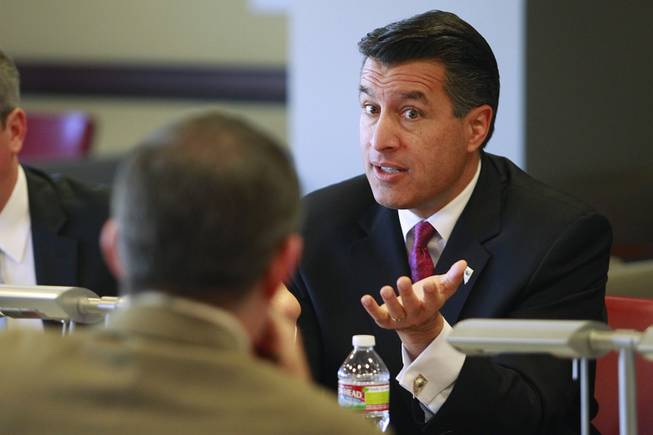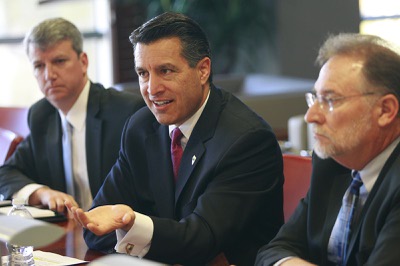
Sam Morris / Las Vegas Sun
Nevada Governor Brian Sandoval speaks to the Las Vegas Sun editorial board Wednesday, Dec. 12, 2012.
Thursday, Dec. 13, 2012 | 2:02 a.m.
View more of the Sun's opinion section
Another view?
View more of the Las Vegas Sun's opinion section:
• Editorials - the Sun's viewpoint.
• Columnists - local and syndicated writers.
• Letters to the editor - readers' views.
Have your own opinion? Write a letter to the editor.
Gov. Brian Sandoval discussed a variety of issues with the Sun’s editorial board on Wednesday. Here’s an excerpt of the discussion regarding his decision, announced Tuesday, to support expanding Medicaid.
Regarding the Affordable Care Act:
I don’t think it’s any secret that I was opposed to the Affordable Care Act. I was not supportive of the personal mandates. I also was concerned about what it would do in terms of our provider services. I also, frankly, was concerned about the fiscal impacts to the state.
Projected savings:
I know (an article on lasvegassun.com) said that it’s going to cost the state $68 million to opt in. It would have cost the state $86 million not to opt in. So, for this two-year biennium, it would save $18 million.
About the savings:
The big piece is this: Right now the state pays for mental health care through the general fund at 100 percent. If we opt in, the federal government will pay for the cost of that. Another piece of that is the pharmacy savings for mental health. And finally is the potential SAPTA (Substance Abuse Prevention and Treatment Agency) savings. We would have to continue to pay that no matter whether we opt in. But by opting in, they cover that.
We also will save because the federal government is going to pay 50 percent of our administrative costs. I also was able to negotiate with (Federal Health and Human Services Secretary Kathleen Sebelius) that right now the government pays 90 percent of our IT costs associated with this, and they’re now going to pay 100 percent.
One of the big issues (and) a concern of mine ... (is about) the impact later on. We get all of these savings up front, as you can see; it’s $16.8 million through 2020. But we’ve also reached an understanding with the federal government that we can opt out at any time we want.
In 2017, we also have the ability to seek a waiver to come down to 100 percent if things change. So we have that type of flexibility in there.
On increasing Medicaid services:
If I didn’t opt in, we were still going to have 30,000 more Medicaid clients whether the law was ever passed. We also would have had 68,000 more on top of that whether we opted in because those are the people who would have been required to purchase insurance or pay a penalty under the law. So that was another decision point for me. By opting in, those people will be paid for by Medicaid, by the federal government, versus them either having to pay a penalty or having to go through the insurance exchange that we have. Now, granted, some of those folks would have been eligible for the subsidies by going through the insurance exchange, but many of them would have been subject to that penalty. So in my mind, it was more prudent to protect them and allow them to come into the Medicaid population at no cost to them. ...
As you start to look at what we could accomplish in terms of covering the populations and what the impact would be to the state budget, it became very clear to me that it was more prudent to opt in versus not opting in.
Businesses and individuals:
The other issue for me was the (impact on) businesses. As part of the Affordable Care Act, small businesses with 50 or more employees would have to provide health insurance or pay a penalty. One of the employers that I met with said that it was going to cost him, if he elected to pay the penalty, $140,000. That’s why I’m going to be building into the budget a reduction in the Modified Business Tax so that I can help offset these increased costs to some of these businesses. ...
I’m going to be asking for a shared responsibility from patients who are going to be involved in Medicaid. It’s a co-pay. It’s going to be a small one. ... I think that’s an appropriate way to go on.
On government’s role in this:
I guess I look at it this way: The Congress passed the Affordable Care Act. I don’t really get into the theoretical piece of it; I get into the reality piece of it and what I have to deal with as the governor. ... It shouldn’t just be about numbers, but I have to take that into consideration as I do this.
It’s no secret that Nevada took a position against the Affordable Care Act and had representation before the Supreme Court. (Chief) Justice (John) Roberts has authored the opinion. That’s a done deal. There was some waiting to see what was going to happen with the election. That’s history, as well, so there’s not going to be any repeal. And replace? It’s not likely (on) any parts of the law.
This law is in front of me; it’s the law of the land. And as the governor, I have to take that into consideration, and that’s exactly what I did.
The bottom line:
In Nevada, a lot of questions have been asked: Why are these other states not opting in? It’s not an apples-to-apples comparison between Nevada and the other states. Frankly, the other states cover more (in Medicaid) than we have historically. Nevada had the most to gain by opting in, and we actually save money on it.


Join the Discussion:
Check this out for a full explanation of our conversion to the LiveFyre commenting system and instructions on how to sign up for an account.
Full comments policy